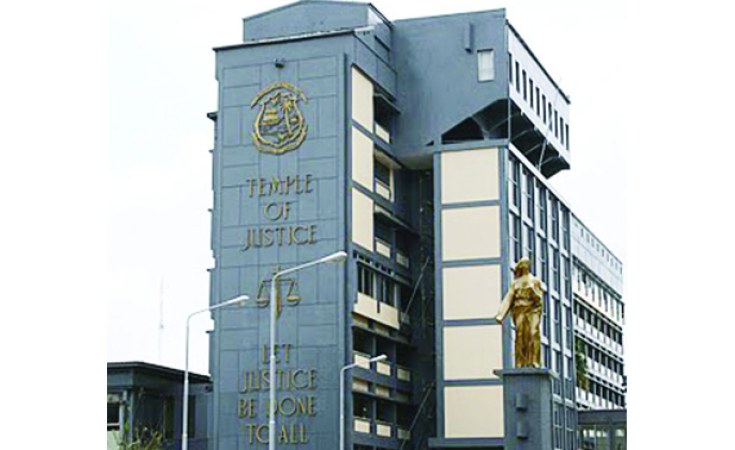The Justice in Chambers of the Supreme Court, Yusif Kaba, was unable to issue a temporary prohibition on the suspension of J. Aloysius Tarlue, the Executive Governor of the Central Bank of Liberia, following Tarlue's assertion that his suspension by President Joseph Boakai violated the Central Bank Act and the Liberian Constitution. Instead, Justice Kaba has forwarded the prohibition request of the suspended Governor to the full bench of the Supreme Court for further consideration.
Tarlue's legal team, led by Counselor Tiawan S. Gongloe, is seeking his immediate reinstatement with all rights and emoluments, and, through a request for a writ of prohibition, urged the Supreme Court to issue a stay order against the suspension to prevent potential implications for other tenure-protected officials.
President Joseph Nyuma Boakai suspended Governor Tarlue recently, reportedly linked to the findings of the General Auditing Commission's compliance audit report, which highlighted issues such as excessive expenditures, deficit financing, and procurement irregularities at the Central Bank. President Boakai cited these audit findings as the basis for Tarlue's suspension.
In response, Tarlue filed a legal challenge arguing that his suspension was unlawful and unconstitutional, emphasizing his fixed five-year term appointment that can only be terminated through National Legislature impeachment. His legal team contended that the suspension violated due process and the separation of powers within the government.
However, after a conference with both parties, Justice Kaba did not issue the stay order to lift Tarlue's suspension--but rather over the weekend transferred the case to the Full Bench of the High Court.
Kaba said most of the things in the petition for prohibition raise constitutional issues that require the hearing of the Full Bench.
He also ordered the Executive Branch to file their defense within eleven days from Friday, August 9, before the Supreme Court.
This process will take several months, at the very least, meaning there will be no hearing until sometime in October, when the Supreme Court might begin hearing cases.
There are two key issues on which the Full Bench is expected to make a determination.
The first had to do with whether President Joseph Boakai has the power to suspend Tarlue and the power to suspend any appointed public officials conferred on the president by the 1986 Constitution; or whether the president has exercised the said constitutional power. Article 56 says officials appointed by the President shall hold their offices "at the will and pleasure of the President."
The other issue is whether the President's suspension of Tarlue violates the Central Bank Act and the 1986 Constitution of Liberia, specifically due process; or whether the President has any constitutional duty to remove the CBL Executive Governor, except through the process of impeachment by the National Legislature.
The case arose from President Joseph Boakai's suspension of Tarlue after an audit of the CBL revealed irregular loans and contracts.
The audit revealed that the CBL under Tarlue's stewardship lent the government US$83 million in November and December 2023, without the necessary approvals, and awarded contracts worth US$11 million over the review period without competitive bidding.
Forty staff members were hired without any evidence of approvals for their contracts, and taxes and contributions were withheld from some employees without being remitted to the relevant agencies, according to the audit, which covers the period 2018-2023. to issue a stay order against the suspension to prevent similar actions in the future.
Tarlue's suspension was intended to allow him to address the findings of the General Auditing Commission's (GAC) compliance audit report, according to the Executive Branch.
The audit uncovered issues such as excessive expenditures, deficit financing, improper transactions, unauthorized payroll financing, potential money laundering concerns, and a lack of competitive bidding in procurement processes.
President Boakai, in his communication to Governor Tarlue, stated, "The decision to suspend you is based on the Auditor General's Report from the Compliance Audit of the Central Bank for the fiscal years 2018-2023."
In counterargument, Tarlue said, the Executive Branch acted illegally and unconstitutionally by suspending him, hence his plea to have the Supreme Court halt the Executive Branch's actions.
Tarlue's other argument is that the suspension violates the Central Bank Act and the 1986 Constitution of Liberia.
He contended that his suspension, executed without a formal hearing, breaches due process and undermines the rule of law.
He further argued that he was appointed on July 15, 2021, for a fixed five-year term--a tenure that can only be terminated through impeachment by the National Legislature, not by presidential decree.
He is also arguing his letter of appointment explicitly states that he had a definite term of service and could not be dismissed or removed from office by the President, except through the process of impeachment by the National Legislature.
He quoted subsection 14.5 of the Amended and Restated Act Establishing the Central Bank of Liberia (1999), which says "a removed party is entitled to due process in accordance with the 1986 Constitution of the Republic of Liberia and other relevant laws."


